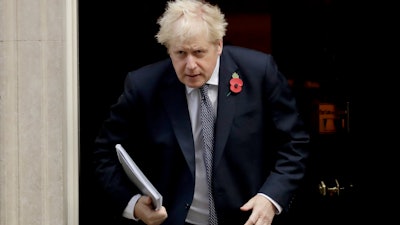
LONDON (AP) — The British government plans to increase its ability to prevent foreign investors from acquiring strategic assets amid increasing concern about the threat to national security posed by potentially hostile states such as China and Russia.
The government on Wednesday will introduce legislation requiring businesses to notify authorities about foreign investment in sensitive industries, including defense, transportation, communications and technology. A new regulatory agency would have 30 days to review potential transactions and either block or impose conditions on those deemed to pose a risk to national security.
The legislation follows similar moves by Britain’s allies, including the U.S., Australia and Germany, amid concerns about the influence of foreign investors such as Chinese technology giant Huawei. Stock market declines triggered by the COVID-19 pandemic have left many companies undervalued by historical standards, heightening concerns about international takeovers.
“The U.K. remains one of the most attractive investment destinations in the world and we want to keep it that way,” Business Secretary Alok Sharma said in a statement. “But hostile actors should be in no doubt – there is no back door into the U.K.”
The legislation applies to deals that would give foreign investors access to U.K. technology and intellectual property, as well corporate takeovers.
Penalties for violating the new rules will be steep, including fines of up to 10 million pounds ($13.3 million), or 5% of worldwide revenue, whichever is higher.
“This bill gives the government the power to scrutinize broad swathes of M&A activity with any U.K. nexus,” said Nicole Kar, head of U.K. competition at the law firm Linklaters. “We therefore anticipate that foreign investment rules, both in the U.K. and internationally, will be an increasingly onerous consideration for overseas investors planning international transactions.”
The government is facing competing pressures to protect strategic national interests while attracting foreign investment after its withdrawal from the European Union.
Sharma said the legislation shouldn’t be an impediment to foreign investment, which created more than 46,000 jobs throughout the U.K. in the last financial year.
Among the transactions that could be affected is U.S.-based Nvidia's plans to buy Arm Holdings, which designed the chips used in most mobile phones, in a deal worth up to $40 billion.
The British government has already said it could intervene in the takeover under existing laws because of the “vital role” Arm plays in the U.K.’s tech sector. The move, which would create a global powerhouse in the chip industry, is also being scrutinized by regulators in the U.S., China and EU.
Some lawyers raised concerns about about the legislation’s retroactive provisions. The bill would give the government power to retroactively review deals in the wider economy for up to five years, even though they aren’t subject to mandatory notification.
“The timing is interesting given the current rhetoric that Global Britain is open for worldwide business as we leave the EU,” said Samantha Mobley, a specialist in competition and mergers at Baker & McKenzie in London. “As the system will be retrospective, from today, investors into the U.K. must navigate the complexities of working out whether their deal falls on the wrong side of the national security calculus.”






















